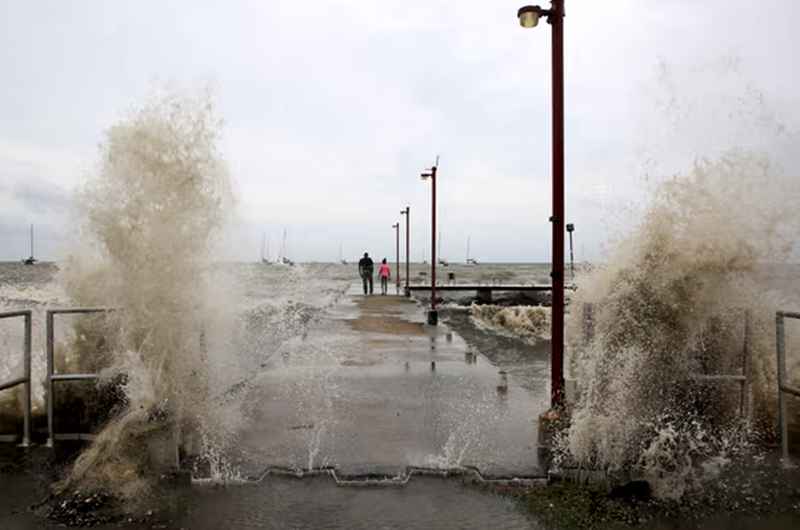Hurricane Beryl: Caribbean leader calls out rich countries for climate failures as ‘horrendous’ storm makes landfall

By Guardian - Natricia Duncan Caribbean correspondent - 1 Jul 2024
Scientists say that human-caused climate breakdown has increased the occurrence of the most intense and destructive tropical storms, because warming oceans provide more energy and increase their strength.
The prime minister of St Vincent and the Grenadines (SVG) has decried a lack of political will in western Europe and the US to tackle global climate change as Hurricane Beryl has made landfall as an “extremely dangerous” category 4 storm.
Speaking from his residence in SVG on Monday, Prime Minister Ralph Gonsalves described the unfolding catastrophe as the “monster” storm ripped off rooftops, including that of the 204-year-old St George’s Anglican cathedral in the country’s capital, Kingstown. He calls Cop ‘largely a talk shop’ and beseeches west to honor commitments.
“We have no electricity, and while I am talking to you, the rain is beating on the official prime minister’s residence, and the winds are howling. And it’s going to get much worse,” he said. “The coming hours are going to be horrendous.”
Torrential rain and gale-force winds downed power lines, smashed vehicles and forced thousands into shelters. Videos posted on social media showed aluminium roofing sheets gliding through the air.
Warning that there is worse to come, the US National Oceanic and Atmospheric Administration described Beryl as “life-threatening”.
Beryl strengthened from a tropical depression to a major hurricane in just 42 hours – a phenomenon recorded only six times before in Atlantic hurricane history.
By Sunday morning, countries across the eastern Caribbean, including SVG, Barbados, Grenada and St Lucia, had been put on hurricane watch. Before the end of the day, a full-blown state of emergency declaration was issued on some islands, with curfews and restrictions on movement.
Beryl has also grounded flights and forced the postponement of major events in the region, including the celebrations around the St Vincent Carnival and the 20-nation Caribbean Community (Caricom) leaders’ summit, which was scheduled for this week in Grenada.
With the winds howling in the background, Gonsalves said:
“For the major emitters of greenhouse gases, those who contribute most to global warning, you are getting a lot of talking, but you are not seeing a lot of action – as in making money available to small-island developing states and other vulnerable countries.
“I am hopeful that what is happening – and we are quite early in the hurricane season – will alert them to our vulnerabilities, our weaknesses and encourage them to honour the commitments they have made on a range of issues, from the Paris accord to the current time.”
SVG – which is still recovering from the effects of a major volcanic erruption in 2021 – and neighbouring Grenada are bearing the brunt of Hurricane Beryl. After the storm made landfall in Carriacou, one of the islands of Grenada, officials said they had received “reports of devastation”.
Gonsalves referred to Cop, the annual UN climate change conference, as “largely a talk shop”.
He also pointed to the UK election campaign as an example of weak political will on climate action.
He said: “Climate change is not playing any major part in the campaigns. While you hear one or two people from the Labour party talk about it and some concerns from the Greens, it is really not at the core of the messages from the major parties to the British people – for the simple reason that it is not an election winner one way or the other.
“The same thing is happening in other parts of the election in western Europe and the United States as countries move to the right. It’s a terrible time for small-island developing states and vulnerable countries.”
Editor Notes.
*The concept of airspraying, or more broadly geoengineering, to curb heat involves deliberate interventions in the Earth's climate system, such as injecting aerosols into the stratosphere to reflect sunlight. This approach is highly controversial and indeed raises concerns related to the principles of Chaos Theory and potential unintended consequences.
Key Points:
- Chaos Theory and Weather Systems: Chaos Theory suggests that small changes in a complex system, like the Earth's climate, can lead to large and unpredictable outcomes. This idea, often illustrated by the "butterfly effect," implies that interventions like airspraying could have unforeseen and potentially severe impacts on weather patterns globally.
- Unpredictability: Because climate systems are complex and interconnected, modifying one aspect can lead to cascading effects. This makes predicting the outcomes of geoengineering difficult, and the potential for unintended consequences is significant.
- Risk of Disruption: Geoengineering methods, such as spraying aerosols to reflect sunlight, could alter precipitation patterns, impact agricultural productivity, and affect natural ecosystems in ways that are hard to foresee and control.
- Ethical and Governance Issues: Implementing geoengineering on a large scale raises ethical questions about who gets to decide to deploy such technology and who is responsible for any negative outcomes. There is also a risk of unequal effects, where some regions may benefit while others suffer.
- Natural Climate System: Disturbing the natural climate system can have long-term implications that are not easily reversible. Once geoengineering techniques are deployed, stopping them could lead to rapid and severe climate changes, a phenomenon known as "termination shock."
In summary, while airspraying and other geoengineering techniques may offer potential ways to curb global warming, they come with significant risks and uncertainties. The complexity of the climate system and the principles of Chaos Theory highlight the need for careful consideration and robust research before pursuing such interventions.
